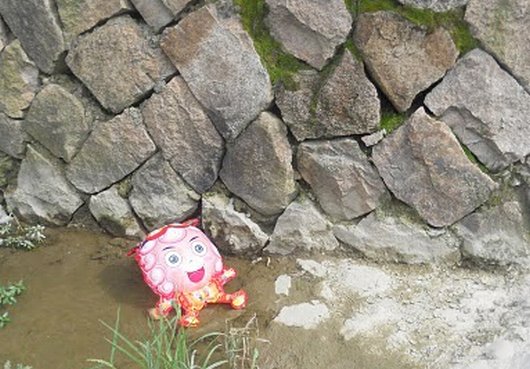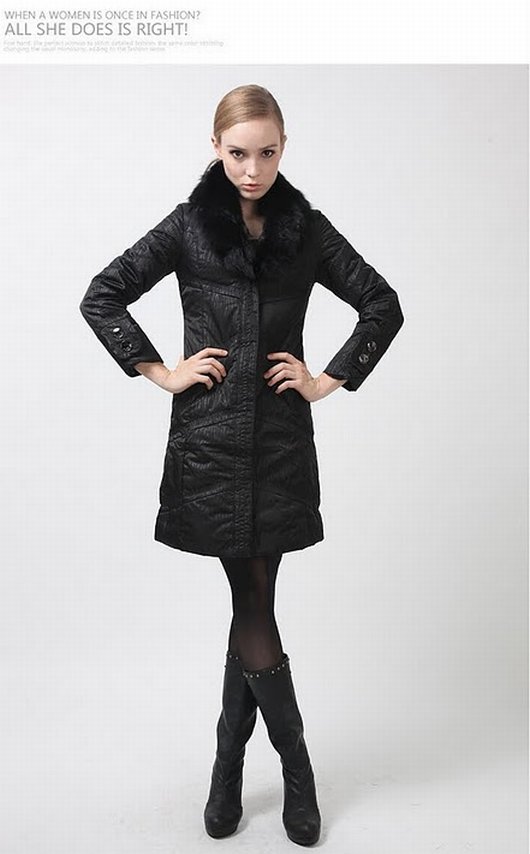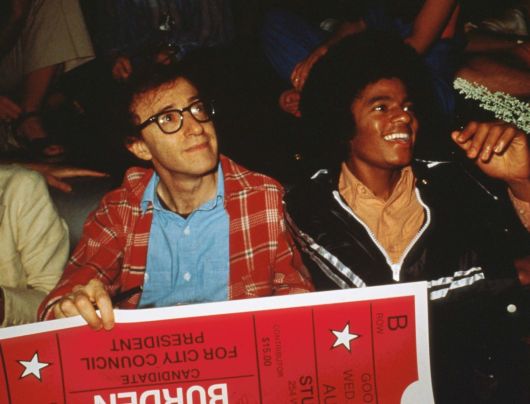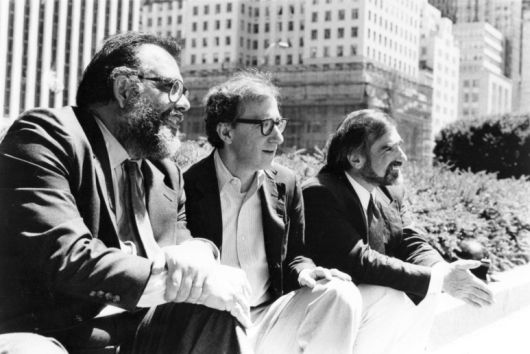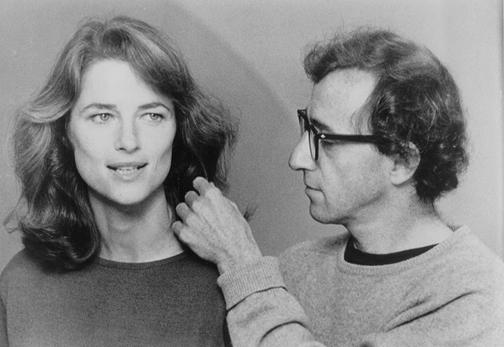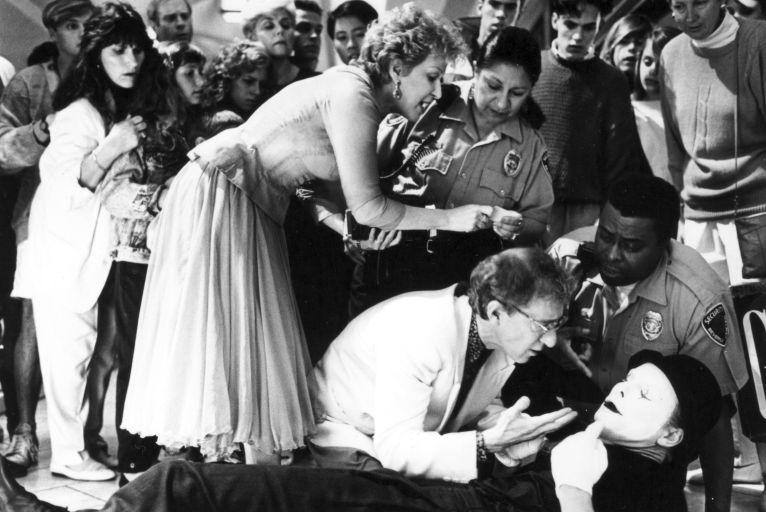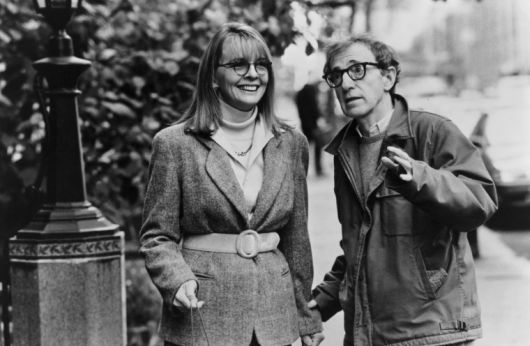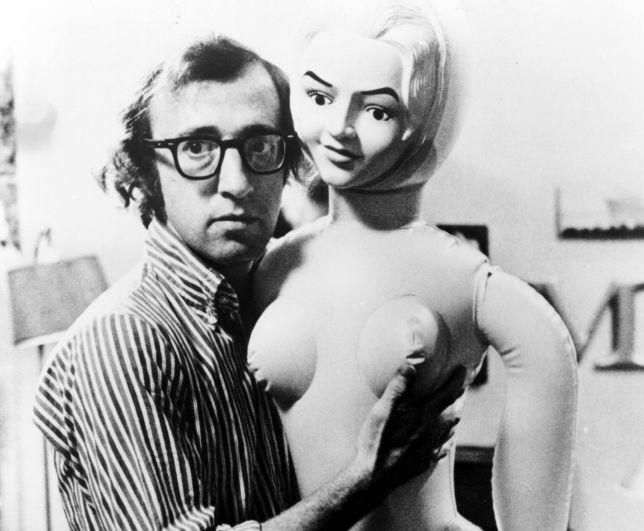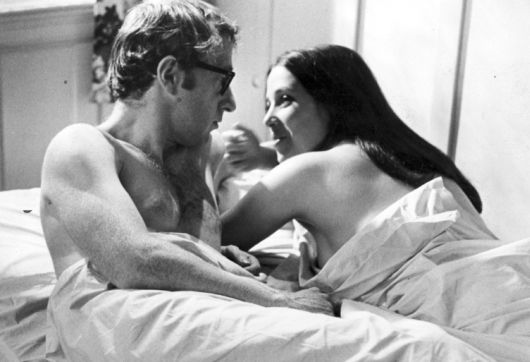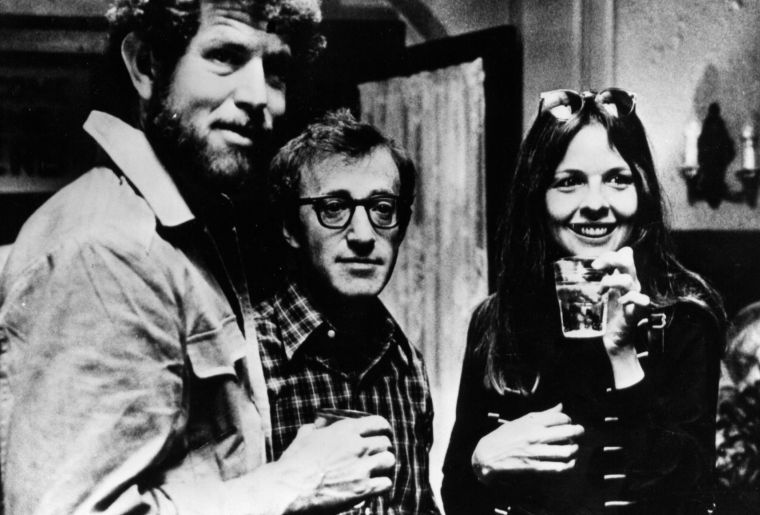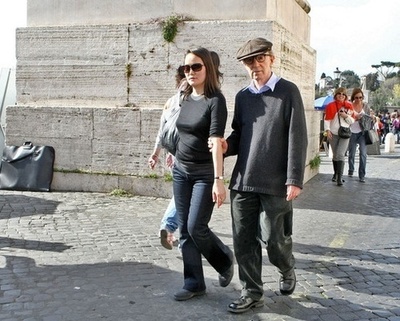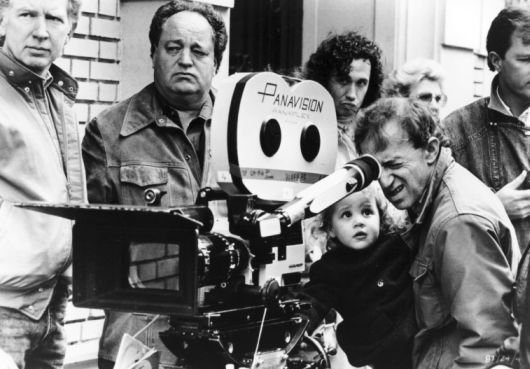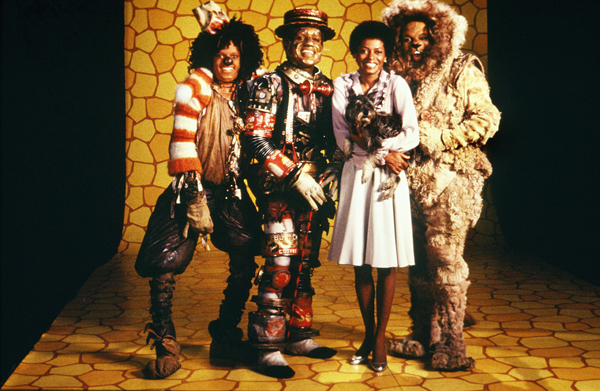 FASHION
FASHION In Which We Manage To Make It Work
 Tuesday, August 9, 2011 at 11:00AM
Tuesday, August 9, 2011 at 11:00AM 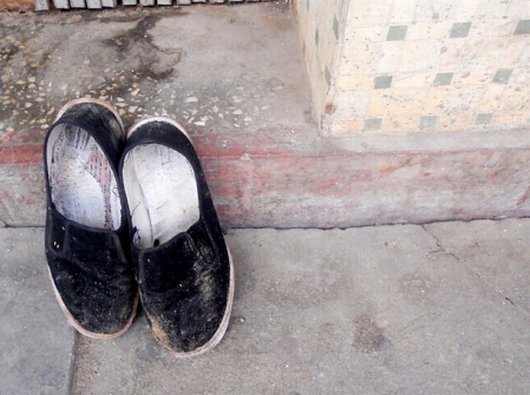
End of the Trip
by JOANNA SWAN
The dwarfing stones caused the city to be even more gigantic for him than it already was. The manmade horizon, the brutal cut in the body of the giant city — it felt as though they were entering the shadow world of hell, when all the boy was seeing was the railroad's answer to the populist crusade to hoist the tracks above the grade crossings so as to end the crashes and the pedestrian carnage.
- Philip Roth, American Pastoral
Davis, California: a veritable Cow-Town where the U.C. Davis Aggies rule the playing field, displaced snowy owls and rabbits foment rage, passionate debate, and press at city council discussions, and Baggins End exists. Davis, California, where greenbelt lanes snake and bike cop citations are a very real threat. Tiny little Davis, my childhood home, where Mom's piano studio was always 98% Asian (to my great delight when Chinese New Year brought moon cakes and recitals brought homemade refreshments and charming extended family).
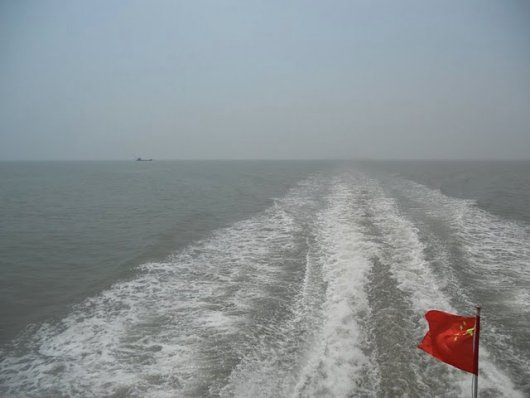
Yearly hongbao, bi-annual chicken foot-y outings to the New China Buffet, shopping at the S.F. Supermarket in Sacramanto, and a plethora of Guangdong take-out notwithstanding, my small-town schooling could never prepare me for the Mainland itself. From childhood home to college life in Walla Walla, Washington, I traded a small-town high school for a degree in a city known for its sweet onions and Seattle expats, and thus was most green (in the wet-behind-the-ears sense, and also in the where-is-the-azure-sky-and-recycling-program sense, too) upon arrival in Beijing.
Peering out of the Beijing taxi window at endless monstrosities of human engineering, I relished the romantic evocations of Scarlett Johansson's Tokyo scenes in Lost in Translation — and felt very small. This wasn't my first experience with Roth's "man-made sublime that divides and dwarfs," but it was the first time I'd been besieged on all sides by Joy City Malls and Easy Life Malls and Paradise Malls and unfinished subway lines and other things that make David Sedaris' snarky turn snarly.
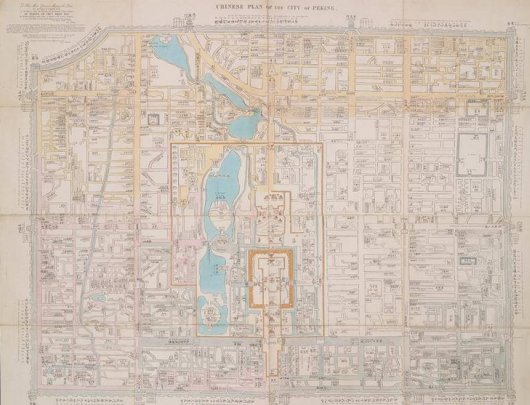 "Plan of the City of Peking," British LithographIn one of the cafes where coffee is not served to businessmen in a corporate casual atmosphere, I was approached by a small man from a table of The Cools: a Chinese girl with platinum white hair, several subscribers to the black monotone dressing doctrine, and a bald Spaniard who kept giving my boyfriend flirty eyes over his latte. Said small man introduced himself as Juan and asked in adorably broken English if I'd like to model some t-shirts as a "foreigner friend." For want of a more compelling professional life, I consented to do a few jobs for VANCL, a Beijing-based online company that seems to hire hoards of waiguo and nationals alike whose thighs are uniformly much less thunder-y than mine.
"Plan of the City of Peking," British LithographIn one of the cafes where coffee is not served to businessmen in a corporate casual atmosphere, I was approached by a small man from a table of The Cools: a Chinese girl with platinum white hair, several subscribers to the black monotone dressing doctrine, and a bald Spaniard who kept giving my boyfriend flirty eyes over his latte. Said small man introduced himself as Juan and asked in adorably broken English if I'd like to model some t-shirts as a "foreigner friend." For want of a more compelling professional life, I consented to do a few jobs for VANCL, a Beijing-based online company that seems to hire hoards of waiguo and nationals alike whose thighs are uniformly much less thunder-y than mine.
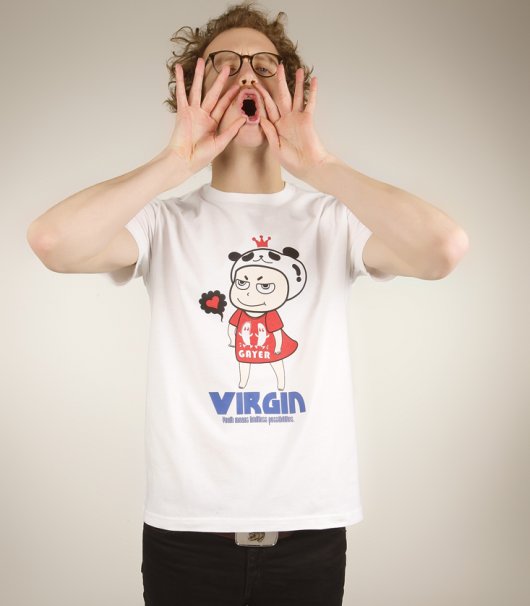 This baffling shirt may or may not be an inside joke of the Chinese youth. Either way, it regularly serves as a reminder of why my boyfriend is extra-cool.
This baffling shirt may or may not be an inside joke of the Chinese youth. Either way, it regularly serves as a reminder of why my boyfriend is extra-cool.
VANCL paid better than my teaching job — 600 RMB per 2-or-3-hour job — and visions of free t-shirts with cutesy graphics danced in my head, reminding me that I had yet to purchase a shirt from Threadless.

The first shoot took place at what had been some sort of factory or government compound: firebrick warehouses and snaking alleys now peppered with hints of film and fashion industry gentrification: shiny luxury vehicles, decay-chic rusted doors, an eerie veil of anonymity. The shoot itself was fun, if not a ringer for Bob Harris' "Suntory Time" translation troubles. I was instructed by photographer Han, a most genial young fellow involved with directing and shooting films (many were, he admitted ruefully, "boring propaganda"), to look happy, drunk (I think?) and also that very distinct misty/innocent/pensive pose that's spotted in manga and certain Asian fashion circles — eyes demurely downward or at a thoughtful 45-degree upwards tilt, chin coquettishly jutting, hands behind back, or finger at lips, feet together, or slightly pigeon-toed.
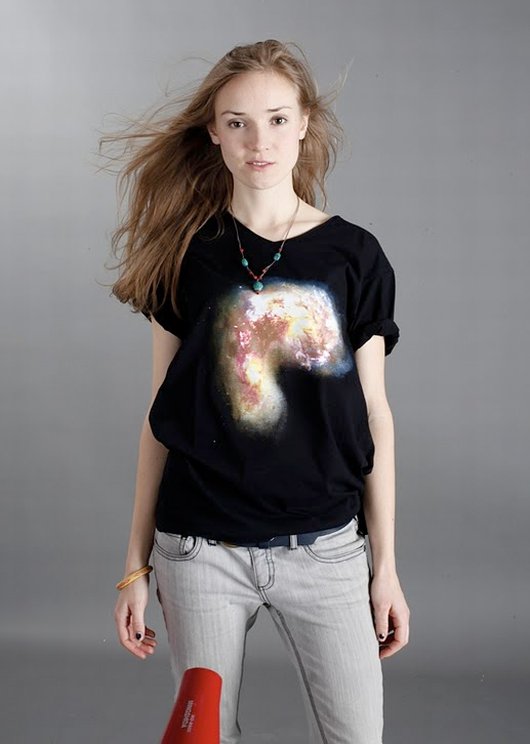
During most shoots, a young man would crouch below me, aiming a hairdryer directly at my head. Half the photos capture my futile attempts to extricate flyaways from my over-glossed lips.
What ultimately inspired the photographers would always be my hair. I'd come with it tied up in a bun, hoping to keep my tresses locked away from the snarls, split ends, and the leonine mane it revels in when freed from ponytail prison; everyone always wanted it down, though — I was to shake, twirl, fluff, flip, twist, braid. I ended up under a curling iron more than once and 45 minutes later the proud stylist would present his creation: Sandra Dee meets Amy Winehouse with bubblegum lipstick.
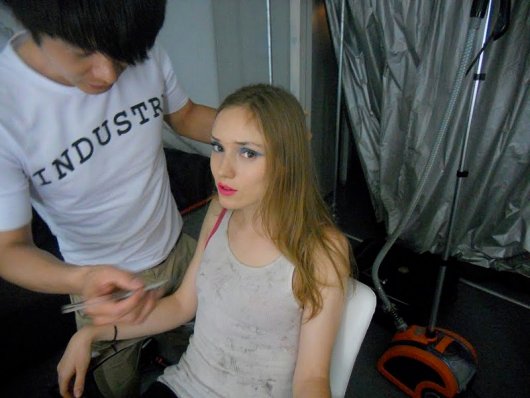 If I look happy, it's because I thought they weren't going to curl my hair.
If I look happy, it's because I thought they weren't going to curl my hair.
I made friends with a girl who'd seen my photos on VANCL, a friend of Juan's. Her job confounded me until I realized that rather than sell clothes, she contracted out photography jobs for companies — they chose the model and backgrounds, she styled and produced the photoshoots. Once, I modeled 60 down coats in June for a big website. It was cool, I got free Victory Vitamin Water.
 Sweating under my pancake makeup. Fashion. It's Height.
Sweating under my pancake makeup. Fashion. It's Height.
I took the 991 bus to her studio to model various outfits, and the bus trip alone cost me three hours of my life roundtrip. I'd sit with my magazines and iPod, watching the bus TV and trying to spot horse-drawn buggies on the road and marveling at the tinted, removed insulation of the Audi dashboards and BMW backseats idling at red lights below me. Such insulation was never afforded a bus passenger, leastwise a laowai.
Once, the blue-uniformed ticket collector helped me with some directions and then asked me about my other, less compelling job: how much did lessons cost for each student? (I told her — 100 RMB to me, 300 RMB to boss-lady.) She had a bit of cilantro in her teeth, perhaps from a recent Beijing Breakfast stop, and gestured at my Lapham's Quarterly every time she mentioned teaching or English. On TV there was a video of Michael Jackson performing the Sawing A Woman in Half magic trick while singing "Smooth Criminal." There were also many yelling ads.
Raised voices being frequent and tolerated in most areas except perhaps temples, shrines, and the respectable sit-down restaurant known as Pizza Hut, the promotions heralded the imminent glee of summertime, liberation at hand. Everyone yelled in these ads: old ladies exclaimed about online shopping deals, a young woman called "wu ba dian commmm!!" (online classified ads) to the world through her cupped hands, two young lovers yelled coyly about chocolate popsicles, an actress and popular microblogger rode a CGI donkey and hollered about something that sounded like "ganji-laaaaaa!" All the while, we scuttled past the blue and white corrugated walls of Yah Gee Modular Housing or JH Prefab Housing, the two choices migrant workers seemed to have regarding city lodging.
On the return trip from my last modeling job, I fell asleep and woke up sweaty as from a fever dream, wondering if my stop had already passed. Wrong as always in my evaluation of China's great breadth, I inconspicuously peeled away my false eyelashes, stained my last Kleenex with melted mauve and dripping beige foundation, and settled down to the last hour of the myriad strange smells of public transportation, aircon drips, and a stomach aching for an icy pop to usher in the oppressive Beijing summer.
Joanna Swan is the senior contributor to This Recording. She is a writer and artist living in Beijing. She last wrote in these pages about living in China. She blogs here and tumbls here.
Photographs by the author and Galen Phillips.

"Love Handles" - Akon (mp3)
"Lock Down" - Ya Boy ft. Akon (mp3)
"Freaky" - Mook, Jadakiss and Shella ft. Akon (mp3)
